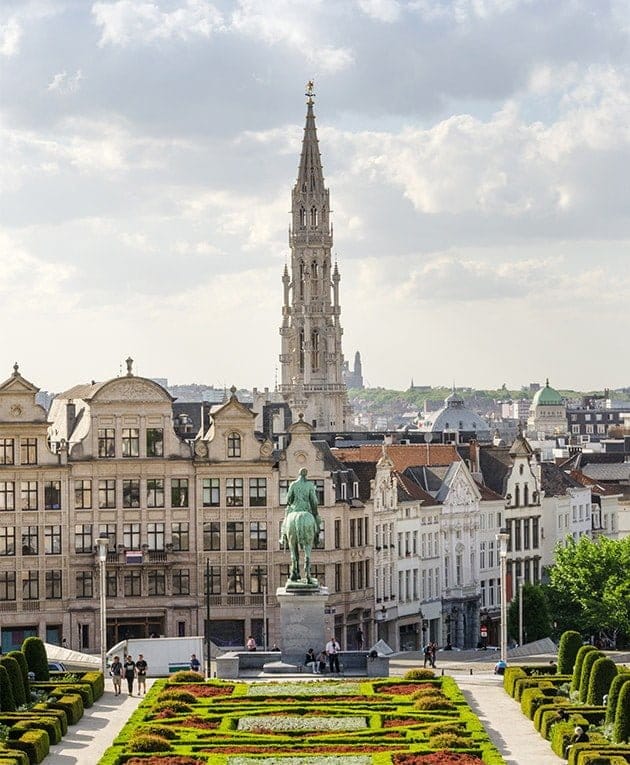-
Popular search terms
A Comprehensive Guide to Studying in:
Belgium

Despite having a population of just over 11 million, Belgium has some notable features. The country has three official languages (French, Dutch, and German), and is world-famous for its beer and chocolate. Its capital city, Brussels, is also the de facto capital of the European Union. Belgium is also one of the most prosperous nations in Europe, whose respected universities provide a steady stream of talented graduates to work within its primary industries of manufacturing, finance, and trade. It has been able to elevate its economy to one of the strongest on the continent partly due to its privileged geographical position, bordering Germany, France, Luxembourg, and the Netherlands as well as being within touching distance of the United Kingdom.
International students make up 10% of the total student population. While the country has incredible linguistic diversity, many higher education courses are taught in English – no doubt a big attraction to potential international students. With the European Parliament housed in Belgium, graduates will have access to some fantastic internship, work experience, and networking opportunities.

Frequently Asked Questions
FAQ
Did You Know? Fun Facts About Belgium
- 1 With around 120 international governmental organizations, 1,400 NGOs, and 181 embassies, the level of international presence in Brussels is second only to New York.
- 2 For young people (under 26 years old), train tickets anywhere within Belgium are only EUR€6.60, making it easy to travel and explore the continent!
- 3 Brussels Airport (or Luchthaven Zaventem) sells the most chocolate in the world. About 1.6kg of chocolate is sold every minute!
- 4 Belgium has produced some of the world's greatest inventors, including Edward J. de Smedt (invented modern road asphalt) and Georges Lemaître (proposed the "Big Bang Theory").
- 5 Belgians pay among the highest tax rates in Europe (between 40-60%).
Which Visas & permits do i need in Belgium
International students who are EU/EEA, Swiss, or UK nationals do not need a visa to study in Belgium. However, it is obligatory to register at the town hall in the city in which you will be residing.
Non-EU/EEA students who want to stay in Belgium for longer than three months need to apply for a student visa. Top tip: Start your application at the Belgian embassy in your home country as early as possible, as the procedure can easily take up between 6-8 weeks. You must submit a copy of your passport, an admission letter from your university, proof of solvency, a certificate of good conduct, a medical certificate, and proof of payment for application fees. The current visa application fee for students is EUR€208.
Banking in Belgium
Many banks have branches in Belgium and can be found in all Belgian cities. Several banks, including ING, BNP Paribas Fortis, and KBC, provide expat services to support international employees and students. Make sure to research each bank before choosing one, as costs for services can vary from bank to bank.
To open a bank account in Belgium, you need to show your passport or another form of identification, proof of residence, and your lease agreement – or you need to show your residence permit. If you are not an EU/EEA, Swiss, or UK national, you will first need to register at the local town hall to obtain the proper forms. You can then proceed to your chosen Belgian bank with the required documents, a copy of your ID, and your home country’s TIN (Tax Identification Number) to open a bank account. Some banks allow you to open a bank account online; you simply submit an online request and the bank will inform you of the next steps.
What do I need to know about healthcare in Belgium
The healthcare system in Belgium is one of the best in the European Union. The Euro Health Consumer Index (EHCI) 2018 ranked Belgium as the fifth-best national healthcare system in Europe.
EU/EEA, Swiss, and UK citizens can apply for the European Health Insurance Card (EHIC). Non-EU/EEA students should apply for a health insurance policy in Belgium – note that Belgian insurance will cover 75% of doctor and hospital visits and only around 20% of prescriptions and basic dental costs. You will need to provide proof of enrollment when purchasing healthcare insurance. Many large universities in Belgium have medical centers which are available to students who need healthcare.
Housing options for students in Belgium
Universities in Belgium have limited on-campus student accommodation. However, there are plenty of off-campus housing options available to students, such as apartments, studios, and rooms. You can rent a room in a shared apartment ranging between EUR€300 and EUR€700 per month. In bigger cities, like Brussels, Ghent, Antwerp, and Leuven, rental prices will be higher.
The standard rental period is typically 12 months – don’t forget to check if utilities, such as water, electricity, and heating, are included in the monthly rent. Hiring an estate agent to look for accommodation will come with extra costs.
What are the public transport options in Belgium
Belgium has impressive public transportation options, including trains, buses, trams, and metros. It is also very well-connected to some of Europe’s biggest cities. You can use a MoBIB (Mobility in Belgium) card to get around in Belgium. The card works for all transport options across the country. You can load different products onto your card, including monthly or annual subscriptions and multi-trip tickets. MoBIB cards can also be used to pay for car parking and car- and bike-sharing services.
Discounted ticket options are also available for students and young people. For young people (under 26 years old), train tickets anywhere within Belgium are only EUR€6.60, making it easy to travel and explore the continent!
How much does a Big Mac cost in Belgium
The Big Mac Index was invented by The Economist in 1986 as an informal way of measuring the purchasing power parity (PPP) between two currencies. The price of a Big Mac in Belgium is around EUR€4 (equivalent to US$4.22 and JP¥540). For US$50, you can buy 11 Big Macs.
Belgium is a relatively affordable place to live, compared to other countries in Europe. Most leisure activities, like sports facilities and transportation, offer student discounts, making the cost of living in Belgium for students quite affordable. The Belgian government requires international students to have a budget of at least EUR€730 (around US$800) per month. This is just under US$10,000 per year for accommodation, food, transportation, and basic personal needs. You should budget more for rent if you plan to live in bigger cities like Brussels or Ghent.